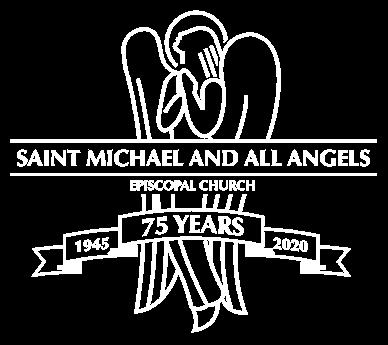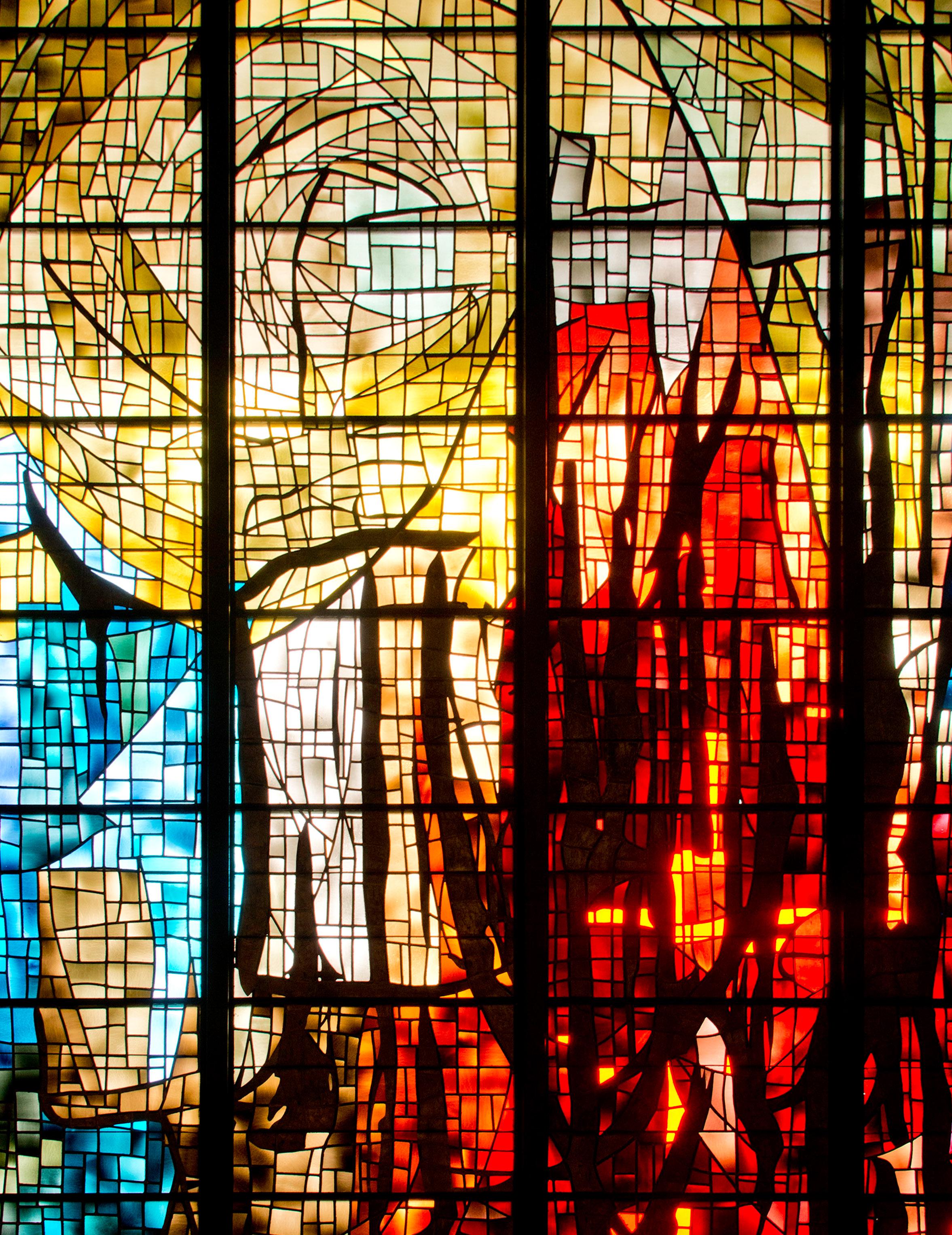Tenebrae
INTRODUCTION
Tenebrae is a Latin word signifying “darkness,” “shadows,” and obscurity. It is a word that pointedly calls our attention to the scriptural accounts of our Lord’s crucifixion: the name of this service is taken from one of the Responsories Tenebrae factae sunt (“darkness came over the whole land”, Mark 15:33). This service gathers into a single evening the themes originally assigned to the last three nights of Holy Week.
Tenebrae has an internal rhythm and structure that reflects the daily prayers and routine of its monastic roots: within Matins (a service for the night, traditionally greeting the day before the sun rises) are three nocturns, each containing three lessons and three responsories: an expression of God the Trinity. Lauds, a service of praise in the morning, begins with a psalm of confidence, and is followed by its Gospel Canticle, the Song of Zechariah—an expression of hope and praise. From this Canticle onwards, we reflect on the suffering and painful reality of the Cross, without the comfort of a final “Amen” or dismissal.
Tenebrae is punctuated by its more conspicuous feature: the gradual extinguishing of light until a single candle representing Christ remains. The candle is then hidden to represent the apparent victory of the forces of evil, but is not extinguished. At the end of the service, a loud noise is made to represent the sound of the earthquake following the crucifixion, and the single candle is restored to its place. Worshippers depart by its light in silence, recalling His suffering on the cross for our sins.
- Drawn from the The Church Pension Fund (© 1996). Reproduced for non-commercial use.
ABOUT THE MUSIC

I’m so delighted to welcome you to the annual Tenebrae service at Saint Michael. This ancient liturgy is rich, and beautifully prepares us for what is to come in the next few days.
Tenebrae is a service with much sung music. Like the Readings, the choral Responsories are appointed texts for this service. Each Nocturn itself represents a kind of liturgical chapter—a mini journey within the overall liturgical flow. In keeping with long-standing tradition, the organ is used less in Holy Week, and indeed, remains silent tonight. We thus hear music created only by human voices. Because our offering of Compline is quite similar, it’s fitting that our Compline Choir sings this service. The first readings from Lamentations have a particular chant used when singing them which highlights the letter of the Hebrew alphabet.
The choral selections in each of the Three Nocturns represent a successive, heightened level of compositional complexity. This intentional programming is to parallel the gradual increase in anticipation created as the Tenebrae liturgy unfolds. Although written in the previous century, the choral Responsories of the First Nocturn use a simple style of composition drawn from late Renaissance polyphony. Important words and phrases are highlighted in subtle ways. The Second Nocturn’s Responsories are from one of the greatest composers of sacred choral music from the late 16th-century. Compared to other compositions by Lassus, the responsories heard tonight are relatively simple in nature. The Third Nocturn’s responsories, also from the late Renaissance period, represent a greater level of activity in the music. In particular, Gesualdo was known to push the limits of composition in his time.
A simpler setting of the Benedictus Dominus Deus, the customary Gospel Canticle of Lauds (Morning Prayer), perhaps refreshes us with its comparatively more joyful, incarnation-driven text heard in a straightforward fashion. A return to a more tension-filled style, but this with a sense of urgency, fills the Christus factus est. Contemporary American composer David Hurd sets the last sung text of the Tenebrae service, Psalm 51, in a poignant, reflective atmosphere that seems ideal to conclude a content-filled service like Tenebrae. His music takes after harmonized Psalm singing called Anglican chant, and highlights aspects of the text in subtle and vivid ways.
Jonathan Ryan Director of Music and Organist

TENEBRAE
Please stand when the ministers enter the church in silence and proceed to their places.
First Nocturn
Psalm 69:1–14 (seated, sung by the Choir)
Antiphon: Zeal for your house has eaten me up; the scorn of those who scorn you has fallen upon me.
Save me, O God: * for the waters are come in, even unto my soul.
I stick fast in the deep mire, where no ground is: * I am come into deep waters, so that the floods run over me.
I am weary of crying; my throat is dry: * my sight faileth me for waiting so long upon my God.
They that hate me without a cause are more than the hairs of my head: * they that are mine enemies, and would destroy me guiltless, are mighty. I paid them the things that I never took: *
God, thou knowest my simpleness, and my faults are not hid from thee. Let not them that trust in thee, O Lord GOD of hosts, be ashamed for my cause: * Let not those that seek thee be confounded through me, O Lord GOD of Israel.
And why? for thy sake have I suffered reproof: * shame hath covered my face.
I am become a stranger unto my brethren: * even an alien unto my mother’s children. For the zeal of thine house hath even eaten me: * and the rebukes of them that rebuked thee are fallen upon me.
I wept, and chastened myself with fasting: * and that was turned to my reproof.
I put on sackcloth also: * and they jested upon me.
They that sit in the gate speak against me: * and the drunkards make songs upon me. But, LORD, I make my prayer unto thee: * in a time acceptable.
Hear me, O God, in the multitude of thy mercy: * even in the truth of thy salvation.
Antiphon: Zeal for your house has eaten me up; the scorn of those who scorn you has fallen upon me.
V. Deliver me, my God, from the hand of the wicked:
R. From the clutches of the evildoer and the oppressor.
1
Lamentations 1:1–14
A reading from the Lamentations of Jeremiah the prophet.
The First Lesson (seated)
Aleph. How solitary lies the city, once so full of people! How like a widow has she become, she that was great among the nations! She that was queen among the cities has now become a vassal.
Beth. She weeps bitterly in the night, tears run down her cheeks; among all her lovers she has none to comfort her; all become her enemies.
Gimel. Judah has gone into the misery of exile and of hard servitude; she dwells now among the nations, but finds no resting place; all her pursuers overtook her in the midst of her anguish.
Daleth. The roads to Zion mourn, because none come to the solemn feasts; all her gates are desolate, her priests groan and sigh; her virgins are afflicted, and she is in bitterness.
He. Her adversaries have become her masters, her enemies prosper; because the LORD has punished her for the multitude of her rebellions; her children are gone, driven away as captives by the enemy.
Jerusalem, Jerusalem, return to the Lord your God!
The First Responsory (seated, sung by the Choir)
In monte Oliveti Healey Willan
On the mount of Olives he prayed to his Father: Father, if it be possible, let this cup pass from me. The spirit indeed is willing, but the flesh is weak. Watch and pray, that ye may enter not into temptation. The spirit indeed is willing, but the flesh is weak.
The Second Lesson (seated)
Waw. And from Daughter Zion all her majesty has departed; her princes have become like stags that can find no pasture, and that run without strength before the hunter.
Zayin. Jerusalem remembers in the days of her affliction and bitterness all the precious things that were hers from the days of old; when her people fell into the hand of the foe, and there was none to help her; the adversary saw her, and mocked at her downfall.
2 Silent Prayer (standing)
Heth. Jerusalem has sinned greatly, therefore she has become a thing unclean; all who honored her despise her, for they have seen her nakedness; and now she sighs, and turns her face away.
Teth. Uncleanness clung to her skirts, she took no thought of her doom; therefore her fall is terrible, she has no comforter. “O LORD, behold my affliction, for the enemy has triumphed.”
Jerusalem, Jerusalem, return to the Lord your God!
The Second Responsory (seated, sung by the Choir)
Tristis est anima mea
Healey Willan
My soul is exceeding sorrowful, even unto death; Tarry ye here, and watch with me. Now shall ye see a multitude come about me; Ye shall flee, and I go to be offered up for you. Behold, the hour is at hand, and the Son of Man is betrayed into the hands of sinners. Ye shall flee, and I go to be offered up for you.
The Third Lesson (seated)
Yodh. The adversary has stretched out his hand to seize all her precious things; she has seen the Gentiles invade her sanctuary, those whom you had forbidden to enter your congregation.
Kaph. All her people groan as they search for bread; they sell their own children for food to revive their strength. “Behold, O LORD, and consider, for I am now beneath contempt!”
Lamedh. Is it nothing to you, all you who pass by? Behold and see if there is any sorrow like my sorrow, which was brought upon me, which the LORD inflicted, on the day of his burning anger.
Mem. From on high he sent fire, into my bones it descended; he spread a net for my feet, and turned me back; he has left me desolate and faint all the day long.
Nun. My transgressions were bound into a yoke; by his hand they were fastened together; their yoke is upon my neck; he has caused my strength to fail. The Lord has delivered me into their hands, against whom I am not able to stand up.
Jerusalem, Jerusalem, return to the Lord your God!
3
The Third Responsory (seated, sung by the Choir)
Ecce vidimus eum Healey Willan
Behold, we have seen him without form or comeliness: his form is gone from him. He hath borne our sins, and his sorrows are for us, He was wounded for our transgressions, and with his stripes we are healed. Surely, he hath borne our griefs and carried our sorrows: and with his stripes we are healed.
Second Nocturn
Psalm 22:1–8, 15–21 (seated, sung by the Choir)
Antiphon: They divide my garments among them; they cast lots for my clothing.
My God, my God, look upon me; why hast thou forsaken me: * and art so far from my health, and from the words of my complaint?
O my God, I cry in the daytime, but thou hearest not: * and in the night-season also I take no rest.
And thou continuest holy: *
O thou worship of Israel. Our fathers hoped in thee: * they trusted in thee, and thou didst deliver them. They called upon thee, and were holpen: * they put their trust in thee, and were not confounded.
But as for me, I am a worm, and no man: *
a very scorn of men, and the outcast of the people.
All they that see me laugh me to scorn: * they shoot out their lips, and shake their heads, saying, He trusted in God, that he would deliver him: * let him deliver him, if he will have him.
My strength is dried up like a potsherd, and my tongue cleaveth to my gums: * and thou shalt bring me into the dust of death.
For many dogs are come about me: * and the council of the wicked layeth siege against me. They pierced my hands and my feet; I may tell all my bones: * they stand staring and looking upon me.
They part my garments among them: * and cast lots upon my vesture.
But be not thou far from me, O LORD: * thou art my succour, haste thee to help me.
Deliver my soul from the sword: * my darling from the power of the dog. Save me from the lion’s mouth: *
thou hast heard me also from among the horns of the unicorns.
4
Antiphon: They divide my garments among them; they cast lots for my clothing.
V. They divide my garments among them:
R. They cast lots for my clothing.
Silent Prayer (standing)
Augustine of Hippo, Treatise on the Psalms
Readings from the Treatise on the Psalms of Saint Augustine, on Psalm 55.
The Fourth Lesson (seated)
“Hear my prayer, O God; do not hide yourself from my petition. Listen to me and answer me. I mourn in my trial and am troubled.” These are the words of one disquieted, in trouble and anxiety. He prays under much suffering, desiring to be delivered from evil. Let us now see under what evil he lies; and when he begins to speak, let us place ourselves beside him, that, by sharing his tribulation, we may also join in his prayer. “I mourn in my trial,” he says, “and am troubled.” When does he mourn? When is he troubled? He says, “In my trial.” He has in mind the wicked who cause him suffering, and he calls this suffering his “trial.” Do not think that the evil are in the world for no purpose, and that God makes no good use of them. Every wicked person lives either that he may be corrected, or that through him the righteous may be tried and tested.
The Fourth Responsory (seated, sung by the Choir)
Tamquam ad latronem Orlande de Lassus
Tamquam ad latronem existis cum gladiis et fustibus comprehendere me: Quotidie apud vos eram in templo docens et non me tenuistis: et ecce flagellatum ducitis ad crucifigendum. Cumque iniecissent manus in Iesum et tenuissent eum, Dixit ad eos:
Quotidie apud vos eram
You come as against a robber with swords and clubs to apprehend me: I was daily with you in the temple teaching and you did not arrest me; and behold you lead me to scourging and to be crucified. They laid hands on Jesus and held him fast, He said to them: I was daily with you
5
The Fifth Lesson (seated)
Would that those who now test us were converted and tried with us; yet though they continue to try us, let us not hate them, for we do not know whether any of them will persist to the end in their evil ways. And most of the time, when you think you are hating your enemy, you are hating your brother without knowing it. Only the devil and his angels are shown to us in the Holy Scriptures as doomed to eternal fire. It is only their amendment that is hopeless, and against them we wage a hidden battle. For this battle the Apostle arms us, saying, “We are not contending against flesh and blood,” that is, not against human beings whom we see, “but against the principalities, against the powers, against the rulers of the darkness of this world.” So that you may not think that demons are the rulers of heaven and earth, he says, “of the darkness of this world.” He says, “of the world,” meaning the lovers of the world–of the “world,” meaning the ungodly and wicked–the “world” of which the Gospel says, “And the world knew him not.”
The Fifth Responsory (seated, sung by the Choir)
Tenebrae factae sunt Orlande de Lassus
Tenebrae factae sunt, dum crucifixissent Jesum Judaei: et circa horam nonam exclamavit Jesus voce magna: Deus meus, ut quid me dereliquisti? Et inclinato capite, emisit spiritum. Exclamans Jesus voce magna ait: Pater, in manus tuas commendo spiritum meum. Et inclinato capite, emisit spiritum.
Darkness fell when the Jews crucified Jesus: and about the ninth hour Jesus cried with a loud voice: My God, my God, why hast thou forsaken me? And he bowed his head and gave up the ghost. Jesus cried with a loud voice and said: Father, into thy hands I commend my spirit. And he bowed his head and gave up the ghost.
The Sixth Lesson (seated)
“For I have seen unrighteousness and strife in the city.” See the glory of the cross itself. On the brow of kings that cross is now placed, the cross which enemies once mocked. Its power is shown in the result. He has conquered the world, not by steel, but by wood. The wood of the cross seemed a fitting object of scorn to his enemies, and standing before that wood they wagged their heads, saying, “If you are the Son of God, come down from the cross.” He stretched out his hands to an unbelieving and rebellious people. If
6
one is just who lives by faith, one who does not have faith is unrighteous. Therefore when he says “unrighteousness,” understand that it is unbelief. The Lord then saw unrighteousness and strife in the city, and stretched out his hands to an unbelieving and rebellious people. And yet, looking upon them, he said, “Father, forgive them, for they know not what they do.”
The Sixth Responsory (seated, sung by the Choir)
Ecce quomodo Orlande de Lassus
Ecce quomodo moritur justus et nemo percipit corde. Viri justi tolluntur et nemo considerat. A facie iniquitatis sublatus est justus et erit in pace memoria eius: Tamquam agnus coram tondente se obmutuit, et non aperuit os suum: de angustia, et de judicio sublatus est. Et erit in pace memoria ejus.
Behold how the righteous one dies And no one understands. The righteous are taken away And no one considers: The righteous have been taken away from present iniquity And their memory shall be in peace. As a sheep before her shearers is dumb, so he opened not his mouth: he was taken from prison and from judgement. And his memory shall be in peace.
Third Nocturn
Psalm 54 (seated, sung by the Choir)
Antiphon: God is my helper; it is the Lord who sustains my life. Save me, O God, for thy Name’s sake: * and avenge me in my strength. Hear my prayer, O God: * and hearken unto the words of my mouth. For strangers are risen up against me: * and tyrants, which have not God before their eyes, seek after my soul. Behold, God is my helper: * the Lord is with them that uphold my soul. He shall reward evil unto mine enemies: * destroy thou them in thy truth.
7
An offering of a free heart will I give thee, and praise thy Name, O LORD: * because it is my comfort.
For he hath delivered me out of all my trouble: * and mine eye hath seen his desire upon mine enemies.
Antiphon: God is my helper; it is the Lord who sustains my life.
V. He has made me dwell in darkness:
R. Like the dead of long ago.
Silent Prayer (standing)
Hebrews 4:15–5:10; 9:11–15a
A reading from the letter to the Hebrews.
The Seventh Lesson (seated)
We do not have a high priest who is unable to sympathize with our weaknesses, but one who in every respect has been tempted as we are, yet without sinning. Let us then with confidence draw near to the throne of grace, that we may receive mercy and find grace to help in time of need. For every high priest chosen from among men is appointed to act on behalf of men in relation to God, to offer gifts and sacrifices for sins. He can deal gently with the ignorant and wayward, since he himself is beset with weakness. Because of this he is bound to offer sacrifice for his own sins as well as for those of the people.
The Seventh Responsory (seated, sung by the Choir)
Eram quasi agnus
Eram quasi agnus innocens:
Tomás Luis de Victoria
ductus sum ad immolandum, et nesciebam:
Concilium fecerunt inimici mei adversum me, dicentes: Venite, mittamus lignum in panem ejus, et eradamus eum de terra viventium.
Omnes inimici mei adversum me cogitabant mala mihi: Verbum iniquum mandaverunt adversum me dicentes.
Venite, mittamus lignum in panem eius, et eradamus eum de terra viventium.
I was like a trusting lamb led to the slaughter. I did not know it was against me that they devised schemes, saying, “Let us destroy the tree with its fruit; let us cut him off from the land of the living.”
All my enemies whispered together against me, and devised evil against me, saying:
“Let us destroy the tree with its fruit; let us cut him off from the land of the living.”
8
The Eighth Lesson (seated)
And one does not take the honor upon himself, but he is called by God, just as Aaron was. So also, Christ did not exalt himself to be made a high priest, but was appointed by him who said to him, “You are my Son, this day have I begotten you;” as he says also in another place, “You are a priest for ever after the order of Melchizedek.” In the days of his flesh, Jesus offered up prayers and supplications, with loud cries and tears, to him who was able to save him from death, and he was heard for his godly fear. Although he was a Son, he learned obedience through what he suffered; and, being made perfect, he became the source of eternal salvation to all who obey him, being designated by God a high priest after the order of Melchizedek.
The Eighth Responsory (seated, sung by the Choir)
Velum templi Carlo Gesualdo
Velum templi scissum est, et omnis terra tremuit: Latro de cruce clamabat, dicens: Memento mei, Domine, dum veneris in regnum tuum.
Petrae scissae sunt, et monumenta aperta sunt, et multa corpora sanctorum qui dormierant, surrexerunt. Et omnis terra tremuit: Latro de cruce clamabat, dicens: Memento mei, Domine, dum veneris in regnum tuum.
The veil of the temple was torn in two, and the earth shook, and the thief from the cross cried out, “Lord, remember me when you come into your kingdom.”
The rocks were split, the tombs were opened, and many bodies of the saints who slept were raised: And the earth shook, and the thief from the cross cried out, “Lord, remember me when you come into your kingdom.”
The Ninth Lesson (seated)
But when Christ appeared as a high priest of the good things that are to come, then, through the greater and more perfect tent (not made with hands, that is, not of this creation), he entered once for all into the Holy Place, taking not the blood of goats and calves but his own blood, thus securing an eternal redemption. For if the sprinkling of defiled persons with the blood of goats and bulls and with the ashes of a heifer sanctifies for the purification of the flesh, how much more shall the blood of Christ, who through the eternal Spirit offered himself without blemish to God, purify your conscience from dead works to serve the living God. Therefore he is
9
the mediator of a new covenant, so that those who are called may receive the promised eternal inheritance.
The Ninth Responsory (seated, sung by the Choir)
Sepulto Domino Tomás Luis de Victoria
Sepulto Domino, signatum est monumentum, Volventes lapidem ad ostium monumenti, Ponentes milites qui custodirent illum. Accedentes principes sacerdotum ad Pilatum, petierunt illum. Ponentes milites qui custodirent illum.
The Lord being buried, the tomb was sealed
By rolling a stone across the door, And soldiers were placed to guard it. The chief priests went to Pilate and petitioned him. And soldiers were placed to guard it.
Lauds
Psalm 63:1–8 (seated, sung by the Choir)
Antiphon: God did not spare his own Son, but delivered him up for us all.
O God, thou art my God: * early will I seek thee.
My soul thirsteth for thee; my flesh also longeth after thee: * in a barren and dry land where no water is. Thus have I looked for thee in holiness: * that I might behold thy power and glory. For thy loving-kindness is better than the life itself: * my lips shall praise thee.
As long as I live will I magnify thee on this manner: * and lift up my hands in thy Name.
My soul shall be satisfied, even as it were with marrow and fatness: * when my mouth praiseth thee with joyful lips. Have I not remembered thee in my bed: * and thought upon thee when I was waking?
Because thou hast been my helper: * therefore under the shadow of thy wings will I rejoice.
Antiphon: God did not spare his own Son, but delivered him up for us all.
V. My flesh also shall rest in hope:
R. You will not let your holy One see corruption.
10
All stand. During the singing of the following Canticle the candles at the Altar, and all other lights in the church except the one remaining at the top of the Tenebrae candelabra are extinguished.
Canticle 4 (standing, sung by the Choir)
Benedictus Dominus Deus Israel
Thomas Morley
Antiphon:
Now the women sitting at the tomb made lamentation, weeping for the Lord.
Blessed be the Lord God of Israel, * for he hath visited and redeemed his people; And hath raised up a mighty salvation for us * in the house of his servant David, As he spake by the mouth of his holy prophets, * which have been since the world began: That we should be saved from our enemies, * and from the hand of all that hate us;
To perform the mercy promised to our forefathers, * and to remember his holy covenant; To perform the oath which he sware to our forefather Abraham, * that he would give us, That we being delivered out of the hand of our enemies * might serve him without fear, In holiness and righteousness before him, * all the days of our life.
And thou, child, shalt be called the prophet of the Highest, * for thou shalt go before the face of the Lord to prepare his ways; To give knowledge of salvation unto his people * for the remission of their sins, Through the tender mercy of our God, * whereby the dayspring from on high hath visited us; To give light to them that sit in darkness and in the shadow of death, * and to guide our feet into the way of peace.
Antiphon:
Now the women sitting at the tomb made lamentation, weeping for the Lord.
After the Canticle, during the repetition of the Antiphon, the remaining candle is taken from the stand and hidden behind the reredos.
11
Christus factus est
Christus factus est pro nobis obediens usque ad mortem, mortem autem crucis. Propter quod et Deus exaltavit illum et dedit illi nomen, quod est super omne nomen.
Christ became obedient for us unto death, even to the death, death on the cross. Therefore God exalted Him and gave Him a name which is above all names.
A brief silence is observed.
Have mercy on me, O God, according to your loving-kindness; * in your great compassion blot out my offenses. Wash me through and through from my wickedness * and cleanse me from my sin.
For I know my transgressions, * and my sin is ever before me. Against you only have I sinned * and done what is evil in your sight. And so you are justified when you speak * and upright in your judgment
Indeed, I have been wicked from my birth, * a sinner from my mother’s womb.
For behold, you look for truth deep within me, * and will make me understand wisdom secretly.
Purge me from my sin, and I shall be pure; * wash me, and I shall be clean indeed.
Make me hear of joy and gladness, * that the body you have broken may rejoice.
Hide your face from my sins * and blot out all my iniquities. Create in me a clean heart, O God, * and renew a right spirit within me.
Cast me not away from your presence * and take not your holy Spirit from me.
Give me the joy of your saving help again * and sustain me with your bountiful Spirit.
I shall teach your ways to the wicked, *
Anthem (kneeling, sung by the Choir)
Felice Anerio
- Philippians 2:8-9
Psalm 51 (kneeling, sung by the Choir) David Hurd
12
and sinners shall return to you. Deliver me from death, O God, * and my tongue shall sing of your righteousness, O God of my salvation.
Open my lips, O Lord, * and my mouth shall proclaim your praise. Had you desired it, I would have offered sacrifice; * but you take no delight in burnt-offerings. The sacrifice of God is a troubled spirit; * a broken and contrite heart, O God, you will not despise.
The Presider says the Collect without chant, and without the usual conclusion.
The Collect (standing)
Almighty God, we pray you graciously to behold this your family, for whom our Lord Jesus Christ was willing to be betrayed, and given into the hands of sinners, and to suffer death upon the cross.
Nothing further is said; but a noise is made, and the remaining candle is brought from behind the reredos and replaced on the stand. By its light the ministers and people depart in silence.
13
The foregoing text of the service contained in this order of worship is taken from the The Book of Occasional Services (2018).
Sunday, April 9








